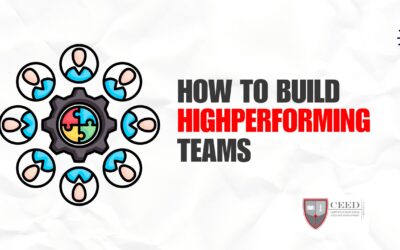Managers with high emotional intelligence create positive work environments, boost employee morale, and reduce turnover. In this blog, we would discuss extensively the role high Emotional Intelligence plays in helping managers become more effective.
What is Emotional Intelligence?
Emotional intelligence refers to the ability to recognize, understand, and manage one’s own emotions as well as the emotions of others.
The importance of emotional intelligence (EI) for managers cannot be overstated, this skill set is crucial for effective management and leadership. A recent TalentSmart study shows that a leader’s emotional intelligence (EQ) is responsible for 58% of his or her job performance, likewise 90% of top performers have high emotional intelligence, underlining its importance in effective leadership. Managers with high emotional intelligence have a higher chance of experiencing better team collaboration, improved employee morale, and enhanced overall organizational performance.
When Do Managers Need Emotional Intelligence?
Emotional intelligence is crucial for managers at all times, but it’s especially important in certain scenarios. Let’s explore a few:
Giving and Receiving Feedback
Providing constructive feedback and accepting criticism are vital aspects of a manager’s role. Emotional intelligence helps managers deliver feedback in a manner that is supportive and motivating, rather than demoralizing. For instance, instead of saying, “You did this wrong,” an emotionally intelligent manager might say, “Here’s a way to improve this.” This approach encourages growth and confidence. Additionally, emotionally intelligent managers can receive feedback without becoming defensive, and use it as a tool for personal and professional growth. According to a study by Harvard Business Review, leaders who can effectively handle feedback are 1.5 times more likely to improve their own performance and that of their team.
Attending to Deadlines
Meeting deadlines often involves significant stress and pressure. Managers with high emotional intelligence manage their own stress and help their team stay calm and focused. They prioritize tasks effectively and motivate their team to meet deadlines without sacrificing quality. For example, instead of showing frustration when a deadline looms, an emotionally intelligent manager might say, “Let’s focus on what we can control and tackle the most critical tasks first.”
Dealing with Challenging Work Relationships
When two team members disagree, an emotionally intelligent manager facilitates a conversation where each party can express their views and work towards a resolution. According to Gallup, teams led by managers who handle conflicts well are 50% more likely to report high levels of collaboration. Interpersonal conflicts are inevitable in any workplace, so only managers would take their time to understand different perspectives, mediate disputes, and build a more cooperative and positive work environment will be able to effectively navigate these challenges.
When Resources are Limited
Lack of adequate resources can lead to frustration and decreased morale and only Managers who are emotionally intelligent can remain composed and resourceful, find creative solutions and maintain team morale despite the challenges. A study by McKinsey & Company shows that companies with managers who excel in resourcefulness are 20% more likely to outperform their competitors.
Managing Change
Organizational changes, such as restructurings or the introduction of new processes, can be unsettling for employees. Managers with high emotional intelligence can communicate changes effectively, address concerns empathetically, and help their team adapt smoothly. If during a major company restructuring, a manager might explain the reasons behind the changes and offer support for affected employees, it helps team members trust the ability of the manager to lead them even more.
Dealing with Setbacks and Failures
Setbacks and failures are part of any business journey. Managers who are emotionally intelligent can maintain a positive outlook, learn from these experiences, and inspire their team to persevere and improve. Emotional intelligence equips managers to handle these scenarios with grace and effectiveness, leading to stronger, more cohesive teams and better overall performance.
The Importance of Emotional Intelligence for Managers
Now that we have established what Emotional Intelligence is and the effect of the lack of it, let’s explore the reasons it is critical for managers:
Improved Team Performance
Managers with high emotional intelligence know how to motivate their teams effectively. They recognize the unique needs and strengths of each team member and assign tasks that play to those strengths. This thoughtful approach not only boosts productivity but also enhances overall team performance, benefiting the entire business.
Effective Leadership
Great leadership involves inspiring and guiding others. Emotionally intelligent managers connect deeply with their team members, and build loyalty and trust. This connection allows them to lead by example and promote a positive, inclusive work culture where everyone feels valued.
Better Decision-Making
Managers with emotional intelligence stay calm under pressure and consider different viewpoints. This ability helps them make well-informed decisions, crucial for solving problems and planning strategically. Their clear, rational thinking ensures better outcomes for the team and organization.
Increased Employee Engagement and Retention
Emotionally intelligent managers create a supportive and engaging work environment where employees feel valued and appreciated. The more job satisfaction rises, the more turnover rates drop. Happy employees are more committed and productive, and contribute to the company’s success.
Effective Conflict Resolution
Conflicts are bound to happen, but their resolution is key. Managers with strong emotional intelligence handle conflicts constructively, and ensure issues are resolved amicably without any escalation. This skill keeps the team harmonious and focused on their goals.
Positive Organizational Culture
Emotional intelligence helps build a positive organizational culture that makes teams feel safer and have more job security. When employees feel safe, respected, and motivated, they are more likely to collaborate and innovate. This culture promotes a shared sense of purpose and drives the organization forward.
How to Build Emotional Intelligence as a Manager
Developing emotional intelligence is essential for effective leadership. While traditional education programs often overlook these skills, there are effective ways to cultivate emotional intelligence.
For managers seeking to bridge their skill gaps and enhance their emotional intelligence, the Managers That Manage Training program is an invaluable resource. This training is designed to equip managers with the skills necessary to drive continuous business growth and achieve high levels of performance.
Industry experts lead the training sessions, providing practical insights on managing challenging situations that can jeopardize business success. They offer strategies on how to lead exceptionally and drive team performance. For example, managers learn how to handle conflicts constructively, ensuring that issues are resolved amicably and do not escalate. This skill is vital for maintaining a harmonious and productive team.
Additionally, the program includes continuous professional development opportunities. Managers can keep updating their skills and stay ahead of industry trends. According to a recent LinkedIn Learning survey, companies that invest in such training programs see significant improvements in employee engagement and overall team performance.
In conclusion, the Managers That Manage Training program offers a comprehensive approach to developing emotional intelligence and other crucial management skills.
If you must be an effective Manager, then continuous learning must be a habit for you. Participating in this training is proof that you are ready to take charge of that business/organisation and set it up for continuous success!




